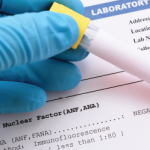NEW YORK (Reuters Health)—A new test provides rapid infliximab drug concentrations that enable immediate dosing adjustments, researchers from Belgium report.
“With this rapid test, our biggest wish is to persuade physicians to now perform and use infliximab measurements also in their own daily clinical practice, as many practical and organizational issues that went along with these measurements have now disappeared,” Dr. Thomas Van Stappen from Katholieke Universiteit Leuven tells Reuters Health.
“On top, the rapid test now allows clinicians to set the right, individualized dosing regimen at the same time a patient visits the hospital,” he says.
The trough concentration of infliximab has been linked to biological, clinical, and endoscopic outcomes, but the usual hospital laboratory assay is time-consuming and does not allow immediate dose optimization.
Dr. Van Stappen and colleagues developed a novel assay for rapid infliximab quantification, benchmarked to a reference infliximab ELISA. They determined infliximab concentration thresholds associated with mucosal healing following induction treatment in 29 anti-TNF-naïve patients initiating infliximab treatment for moderate to severe ulcerative colitis.
Results from the new assay showed very good correlation with ELISA results for samples withdrawn during induction and maintenance of infliximab treatment, the team reports in Clinical and Translational Gastroenterology, online Dec. 8.¹
Based on a comparison of infliximab levels between patients who experienced mucosal healing (n=13) and those who did not (n=16), the infliximab concentration threshold using the new assay appeared to be >=2.1 mcg/mL (sensitivity 100%, specificity 50%).
Patients with lower levels who did not initially have mucosal healing benefited from an intensified dose regimen, with three of four of these patients successfully completing two years of infliximab treatment.
Another new assay proved more sensitive for detecting anti-infliximab antibodies (34% of patients, 16% of samples) compared with an existing assay (14% of patients, 2% of samples).
Dr. Van Stappen highlighted two important applications of this new test in daily clinical practice.
“The first one would be to apply the rapid assay in patients receiving infliximab induction treatment, at Weeks 2, 6 and 14, as many research groups are clearly demonstrating that infliximab concentrations during induction treatment reflect the drug’s clinical effect,” he says.
“The second application of the rapid test would be in patients experiencing a flare during infliximab maintenance treatment,” he explains. “Way too often these patients are randomly dose intensified or switched to another drug, which is often not the right treatment for each patient. With a rapid infliximab test, clinicians can immediately determine whether the loss of response is due to low drug exposure, which can be caused by immunogenicity (warranting an anti-infliximab antibody measurement), or by other (non-disease) related mechanisms.”
“In either case, the test outcome will allow clinicians to immediately optimize the treatment regimen and increase clinical outcomes,” Dr. Van Stappen says.
He adds, “We would like to stress that, whatever assay is used, ultimately the patient’s wellbeing is most important. If he or she does not feel well and experiences a disease flare, one should make use of all available tools, including infliximab monitoring, to rapidly improve his or her health. Anybody who would like to collaborate with us to help us achieve this goal can always contact us.”
Dr. Van Stappen believes the eventual cost of the assay will be “slightly more expensive than a typical ELISA test as it clearly provides additional practical advantages. (In Europe, patients are charged roughly euro 30-60/per analysis by ELISA.) However, the price of the rapid test will still be in a reasonable and affordable range and will definitely modify the infliximab monitoring landscape.”
The researchers reported no commercial funding for the study and declared no conflicts of interest.
Reference
- Van Stappen T, Bollen L, Vande Casteele N, et al. Rapid test for infliximab drug concentration allows immediate dose adaptation. Clin Transl Gastroenterol. 2016 Dec 8;7(12):e206. doi: 10.1038/ctg.2016.62.
